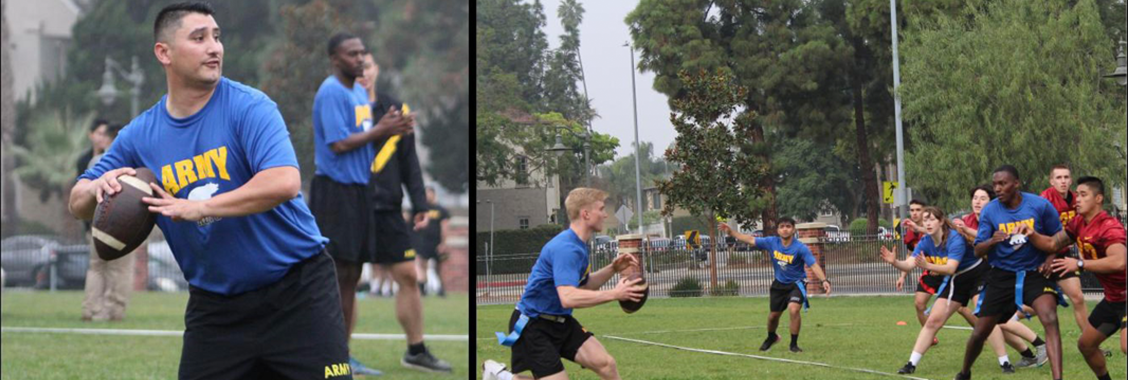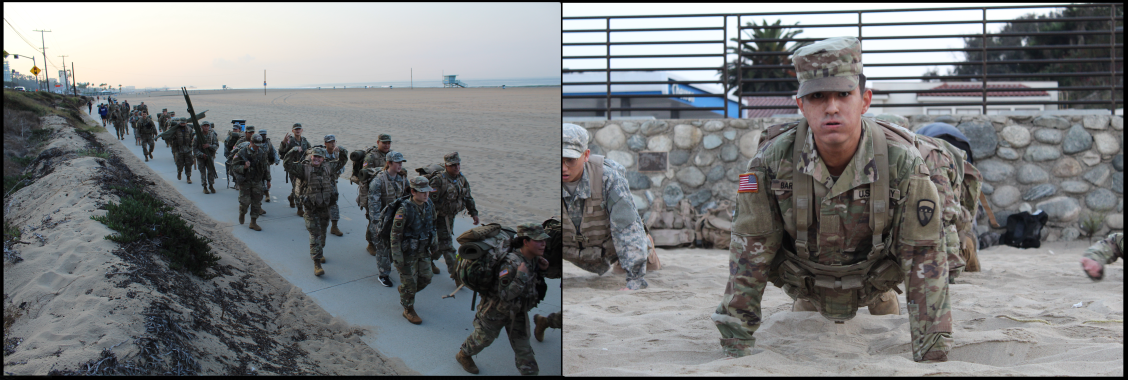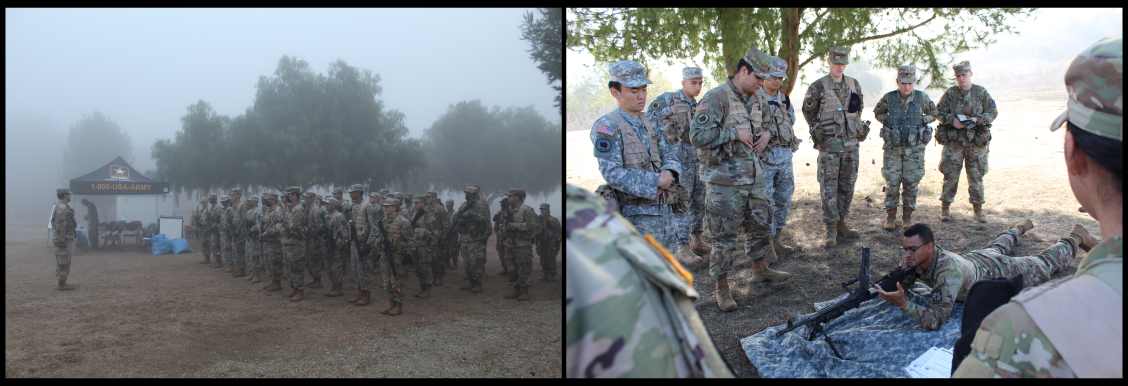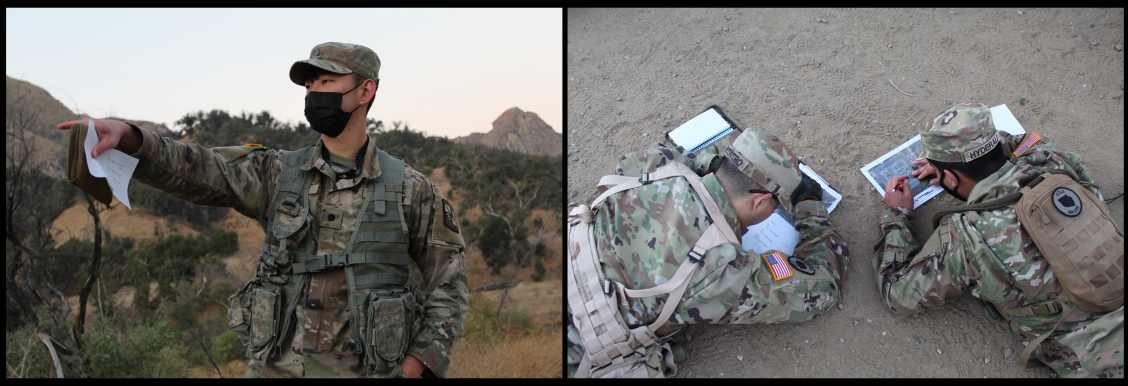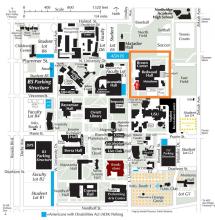Matadors Lead the Way!
CSUN Army Reserve Officers' Training Corps is a cross-enrollment program apart of the UCLA Army ROTC Bruin Battalion. The program hosts one of the best leadership development programs in the nation and trains Cadets/Students to become future Officers in the U.S. Army.
Army ROTC is an elective curriculum taken with your required college classes. The program gives you tools, training and experiences that will help you succeed in any competitive environment. Along with great leadership training, Army ROTC can pay for your college tuition. Because Army ROTC is an elective, Students can participate and complete the first two years of military science with absolutely no military service obligation. You will have a normal college student experience like everyone else on campus.
If you continue through your junior and senior years, you will be commissioned as an Officer in the Army when you graduate. At that point, you will have a wide range of interest areas you can specialize in called branches.
Veterans, National Guardsmen, Army Reservists and students who complete a four-week leadership course at Fort Knox, Ky., receive credit for the missing the first two years of ROTC and military science classes. This allows for the completion of ROTC in as few as two school years (4 Semesters).
Freshman through senior military science courses are offered every semester. After junior year (summer before senior year) students attend a four week Cadet Leaders Course with their peers, under the guidance of experienced Army Instructors at Fort Knox, Kentucky.
What It Takes to Succeed
To participate in ROTC, potential students must be accepted into CSUN (or partnership schools) as an undergraduate or graduate student.
Students who bring the following attributes to the military science program have the highest rate of success:
- Scholar (3.00 or higher GPA)
- Athlete (participation in team or individual sports or physical activities)
- Leader (elected or appointed to leadership positions in school, sport, community, volunteer and/or spiritual organizations)
A strong desire and will to successfully complete the military science program can overcome shortfalls in any of the above-listed attributes.
Students are encouraged to participate in weekly physical fitness and athletic activities throughout the school year. Students will prepare for and take an Army physical fitness test that evaluates the student's ability to accomplish six exercise tasks:
- Three repetition maximum deadlift
- Standing power throw
- Hand release push-ups
- Sprint-drag-carry
- Plank
- Two-mile run
https://www.armycombatfitnesstest.com/scoringstandards
Courses
Military Science I - Freshman Year
- Introduction to leadership (values, attributes, skills, actions)
- Personal development (time management, stress management, health and fitness, goal setting and communications)
- Officership and the Army profession
- Orienteering, map reading, land navigation, basic tactics
Military Science II - Sophomore Year
- Foundations of leadership (team building, situational leadership, adaptive leadership, leadership analysis)
- Personal development (briefings, interpersonal communication, effective writing, advanced time management)
- Officership, Army values and ethics, consideration of ethics
- Advanced map reading, terrain analysis, route planning, problem solving, battle drills, offensive operations
Military Science III - Junior Year
- Adaptive team leadership (team dynamics, developing future leaders, leadership styles and behavior)
- Personal development (effective communications, stress management)
- Army values and ethics (warrior ethos), risk management
- Advanced map reading, intelligence preparation of the battlefield, troop leading procedures, squad tactics
Cadet Summer Training
- CST at Fort Knox, Kentucky (usually summer after junior year). The purpose of the course is to train U.S. Army ROTC Cadets to Army standards, to develop their leadership skills, and to evaluate their officer potential. Most Army Cadets attend CST between their junior and senior undergraduate years after having contracted to join the Army. Successful completion of CST is a prerequisite to becoming an Army officer through ROTC.
Military Science IV- Senior Year
- Developmental and adaptive leadership (physical fitness programs, effective communications)
- Military professional ethics, ethical decision-making, code of conduct, rules of engagement, cultural awareness
- Training, risk management process, counseling, evaluation reports, career management
- Military decision-making process, organization for combat, supply and logistics, military history
Career Opportunities
After graduating from the program, Cadets receive a commission as a Second Lieutenant. The Cadet has the option of serving in the National Guard or Army Reserve as a part-time career, or on active duty in the regular Army as a full-time profession. Lieutenants in the Army lead people, while also managing equipment, vehicle fleets and financial resources. Immediately after graduating from college, new Lieutenants are routinely put in charge of and lead groups of up to 40 people. Officer career specialties in the Army are as diverse as those found in the civilian sector. Learn about specific branches and Army Careers.
17 Branches (specialties) students can request as an Army Officer include the following:
Except for the health professions, an officer's specialty in the Army does not have to be related to his or her university academic degree. New Lieutenants who go into the regular Army serve on active duty for three or four years, and may then transfer into the reserves. Lieutenants commissioned in the National Guard or Army Reserve serve their entire tour in the Reserves.
Career Options with a Graduate Degree
Army career fields that require a graduate degree are not typically available to commissioned officers until after the sixth year of commissioned service. These include the following:
- Foreign Area Officers (Military attaches to the U.S. Diplomatic Corps)
- United States Military Academy at West Point Faculty
- White House Fellowships
- Operational Research and Systems Analysts
- Army Acquisition Corps personnel (Research and Development)
- ROTC professors of Military Science
- Officers accepted into these career fields attend leading universities and the Army often pays for these graduate programs
Potential Career Growth
- Promotion from Second to First Lieutenant is approximately 18 months
- Promotion from First Lieutenant to Captain is approximately 18 months
- Promotion from Captain to Major is approximately six and a half years
- Promotion from Major to Lieutenant Colonel is approximately five and a half years

